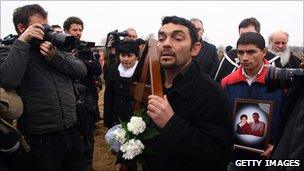Amnesty accuses Hungary of failing to protect Roma
- Published

Six murders were reported during attacks on Hungary's Roma population in 2008 and 2009
Amnesty International has accused Hungary of not doing enough to prevent and respond to violence against the country's large Roma population.
The human rights group has identified what it calls "shortcomings and gaps" in Hungary's criminal justice system.
Focusing on a series of attacks in 2008-09, it says police failed to record some of them as hate crimes.
Hungary denies the allegations, saying all citizens are protected by the law, regardless of ethnicity.
But the Ministry of Justice added that it would carefully examine the allegations and recommendations the organisation had made.
The Amnesty report looks at several attacks on Roma settlements - resulting in six deaths - which took place over more than a year and ended in August 2009.
Four men were arrested after a massive police operation and are expected to go on trial soon, charged with murder.
"The Hungarian authorities have a duty to prevent discrimination and to ensure justice for victims of hate crimes," says Nicola Duckworth, director of Amnesty's Europe and Central Asia programme.
"This includes the obligation to investigate whether or not racial and ethnic hatred or prejudice played a role in these and any similar attacks."
Social inclusion
The BBC's Nick Thorpe in Budapest says the Amnesty report suggests that anti-Roma prejudice runs very deep in Hungarian society.
The new conservative Fidesz government, elected in June this year, has made law and order one of its priorities, and has promised to increase the size and prestige of the police force.
It has also appointed Hungary's first ever minister for social inclusion.
In the same election, the far-right group Jobbik won nearly 17% of the vote - partly thanks to a campaign which identified what it calls "gypsy crime" as one of the country's main problems.
- Published16 September 2010
- Published2 October 2010